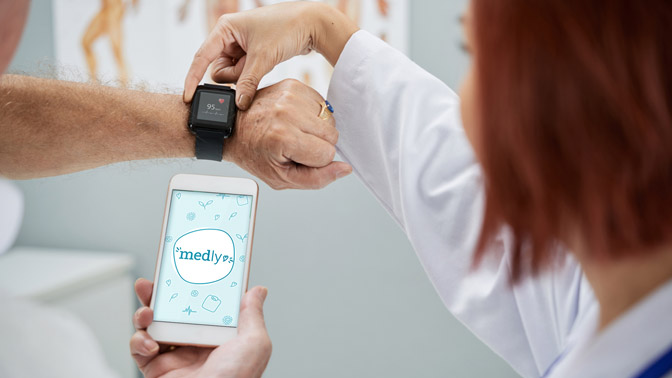
A heart monitoring app developed at UHN has been found to reduce hospitalizations, improve heart health, and increase wellbeing and self-care in patients with heart failure.
Known as Medly, the app collects data on patient symptoms and three heart health metrics: blood pressure, heart rate and patient weight. It then analyses the data using clinically-validated algorithms to provide instant feedback to patients—in the form of app notifications.
The app also alerts the clinical care team of serious changes to the health status of patients. The app sorts and triages these alerts by importance, enabling one nurse to manage up to 350 patients. It’s important to note that the app does not replace clinical visits—instead it provides added support to patients and clinical staff between these visits.
The effectiveness of the app was recently evaluated in a clinical study published in the Journal of Medical Internet Research. The study was led by UHN’s Dr. Patrick Ware, Lead of Implementation Science at eHealth Innovation, and senior author Dr. Emily Seto, Techna Affiliate Scientist and Assistant Professor at the University of Toronto's IHPME.
The study enrolled 315 patients at the Peter Munk Cardiac Centre. Over a one-year period, the research team evaluated the app through a variety of ways. These included heart health (using blood tests), the ability of the heart to pump blood, the number of hospitalizations, as well as patient wellbeing and self-care. Patients were only provided the app for the last six months of the study. This enabled the research team to compare a patient’s health with and without the app.
“We found that use of Medly reduced heart failure-related hospitalizations by half; as well, use of the app was associated with improved heart health, patient wellbeing and patient self-care,” says Dr. Ware.
The findings suggest that telemedicine-based support could help improve the health of the more than one million Canadians affected by heart failure. The technology could also drastically lower health care costs by reducing unnecessary hospitalization.
Dr. Heather Ross, the co-developer of the app explains, “because the app better informs patients and clinical staff of health status changes, and does so instantly, patients receive the right care at the right time—this is a transformational change.”
This work was supported by the Toronto General & Western Hospital Foundation.
Ware P, Ross HJ, Cafazzo JA, Boodoo C, Munnery M, Seto E. Outcomes of a Heart Failure Telemonitoring Program Implemented as the Standard of Care in an Outpatient Heart Function Clinic: Pretest-Posttest Pragmatic Study. J Med Internet Res. 2020 Feb 8;22(2):e16538. doi: 10.2196/16538.




